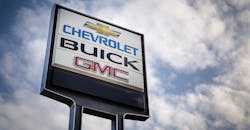More than two weeks after concerns over COVID-19 shuttered U.S. truck and car plants, the virus has come for the other end of automakers’ operations: sales. General Motors and Fiat-Chrysler released their first-quarter 2020 sales figures for January through March on April 1, and both noted a tangible decrease in the number of people buying cars compared to years past.
General Motors reported that it delivered 618,335 vehicles in the first quarter of 2020, 7% fewer units than it did for the same time period last year. Meanwhile, Fiat-Chrysler’s US division reported sales of 446,768 vehicles for the quarter, compared to 498,425 during the first part of FY 2019.
Both companies tied the loss of sales to the effects of the coronavirus outbreak, which in many areas has forced firms not associated with critical infrastructure to close down. According to GM, many dealerships in states with stay-at-home orders remain open as “essential” infrastructure. But that doesn’t mean the customers will follow.
Kurt McNeil, VP of U.S. sales operations with GM, called the times “uncertain and challenging.” Jeff Kommor, head of sales for FCA U.S., praised dealerships for continuing “to provide critical support” for Fiat customers and taking steps to keep their businesses clean.
Many restaurants in effected areas have temporarily adapted to models that encourage customers to order delivery or takeaway, and in order to cope with the demand crunch caused by the crisis, so have GM and FCA. McNeil, in a statement, touted GM’s “Shop. Click. Drive.” program as a way for dealership-wary customers to look at inventory and schedule home deliveries, and FCA offers an “online retail experience” that does mostly the same thing.
Purchasing a car via delivery isn’t a new idea: Carvana, an online used-car retailer founded in 2012, has made car delivery a central part of its services. But it remains to be seen whether or not it will make a difference for customers who might be stuck at home themselves for the near-term future.
About the Author
IW Staff
Find contact information for the IndustryWeek staff: Contact IndustryWeek
